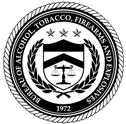 |
ATF’s 5,000 employees enforce federal criminal laws and regulate the firearms and explosives industries. ATF investigates violent crimes involving firearms and explosives, acts of arson, and illegal trafficking of alcohol and tobacco products. ATF also provides training and support to its federal, state, local, and international law enforcement partners and works in 25 field divisions with representation throughout the United States, Puerto Rico, U.S. Virgin Islands, and Guam. Foreign offices are located in Mexico, Canada, Colombia, and representatives in France, the Netherlands, Iraq, and El Salvador. |
Investigations
During this reporting period, the OIG received 239 complaints involving ATF personnel. The most common allegations made against ATF employees were waste, misuse of government property, and theft. The OIG opened 4 cases and referred 14 allegations to ATF’s Office of Professional Responsibility for its review. The majority of the complaints were considered management issues and were provided to ATF for its review and any appropriate action.
At the close of the reporting period, the OIG had 9 open criminal or administrative investigations of alleged misconduct related to ATF employees. The criminal investigations include waste, misuse of government property, and theft.
Procedural Reform Recommendations
The OIG prepares a Procedural Reform Recommendation recommending corrective action by a Department component when an investigation identifies a systemic weakness in an internal policy, practice, procedure, or program. During this reporting period, the OIG sent a Procedural Reform Recommendation to ATF concerning maintaining and disposing of personal property recovered from defendants.
The OIG had initiated an investigation based on information received from the ATF Miami Field Division that personal property valued at $1,600 that had been seized from defendants upon their arrest by the ATF was stolen. At the time, there was no ATF regulation to address the processing of personal property not related to evidence that was seized from a defendant upon arrest. Without a defined policy, inconsistent handling, storing, and disposing of non-evidentiary personal property is likely to occur, creating a less secure environment and providing opportunities for seized personal property to be stolen or lost.
The OIG recommended that ATF modify its nationwide operating manual to include a process for handling, storing, and disposing of non-evidentiary seized personal property.Ongoing Work
The OIG is reviewing ATF’s implementation of Project Gunrunner, ATF’s national initiative to reduce firearms trafficking to Mexico and associated violence along the Southwest border. The review follows an OIG review completed in September 2009 that examined ATF’s planning, hiring, staffing, and allocation of resources for Project Gunrunner. The current review is evaluating the extent to which ATF’s intelligence and investigative capabilities have reduced firearms trafficking into Mexico and associated violence along the Southwest border.
The OIG is evaluating the use, management, and effectiveness of ATF’s National Response Team, which assists federal, state, and local investigators at the scenes of significant fire and explosive incidents.